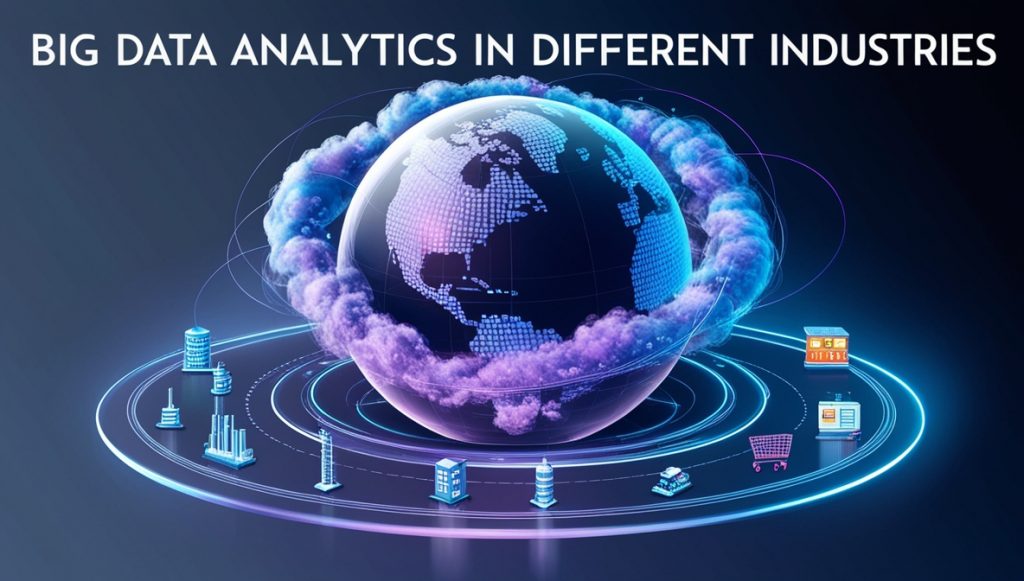Big data analytics has transformed how businesses operate by allowing them to analyze vast amounts of data to make informed decisions. Different industries are harnessing this capability in unique ways.
However, marketing in particular faces unique challenges due to privacy regulations and ethical considerations. Industries that collect and analyze customer data must navigate restrictions like the General Data Protection Regulation (GDPR) in Europe or the California Consumer Privacy Act (CCPA) in the U.S., which impose limitations on how personal information can be used. These regulations protect consumers from exploitation, ensuring companies are transparent and responsible in their marketing efforts.
The Power of Big Data Analytics Across Industries
Big data analytics empowers companies to rapidly process information, providing actionable insights that drive better decision-making, streamline operations, and enhance customer experiences.
In the healthcare sector, big data is used to track patient outcomes, predict disease trends, and fine-tune treatment plans, leading to more efficient care. Meanwhile, in finance, it’s a tool for improving fraud detection, automating loan processes, and refining risk management. Retailers rely on it to understand consumer behaviors and preferences, allowing for highly personalized marketing campaigns that increase engagement and boost sales. In manufacturing, predictive analytics minimizes downtime and optimizes supply chain management, cutting costs and improving efficiency.
What sets big data apart is its adaptability. Entertainment platforms like Netflix harness data to offer personalized content recommendations, ensuring users stay engaged. Even government sectors use big data to improve public services—analyzing traffic patterns, surveillance data, and social trends to optimize urban planning and enhance public safety.
Online casinos also capitalize on big data to recommend tailored promotions. For instance, using customer data, they can offer targeted deals to users who frequently participate in poker events or similar games. It enhances customer retention and increases user engagement through customized promotions.
However, while big data provides clear benefits, it raises significant privacy concerns. Industries must carefully balance leveraging data for insights with respecting privacy regulations making compliance a critical element of their marketing strategies.
The Dilemma: Marketing Restrictions and Data Privacy Laws
Data usage restrictions have become a growing challenge as industries rely on data to drive marketing strategies. Introducing regulations such as the GDPR in Europe and the California CCPA in the U.S. has reshaped how businesses handle customer information. These laws mandate that businesses obtain explicit user consent before collecting, processing, or sharing their data, significantly restricting how marketing teams can operate.
For example, retail companies traditionally analyzed customer purchase data to offer personalized promotions. Today, however, they must ensure that every piece of marketing data complies with privacy regulations. Failing to do so can lead to hefty fines, legal battles, and damage to a company’s reputation.
Similarly, big data is used in the healthcare sector to improve patient care. Still, stringent regulations around data privacy mean that healthcare providers must anonymize patient data before using it in marketing campaigns. Even industries like financial services, which benefit from fraud detection and risk management data, must ensure that customer data is handled with the utmost care, especially when using it for cross-selling products or sending personalized financial advice.
Creative Solutions Amidst Restrictions
Despite these challenges, companies are finding innovative ways to navigate marketing restrictions while leveraging big data’s power. One approach is data anonymization, where personal identifiers are removed from datasets, allowing companies to analyze trends without infringing on individual privacy. It is common in sectors such as healthcare and finance, where data is highly sensitive.
In addition, consent management platforms are becoming crucial for businesses, particularly in retail and online services. These platforms help companies manage user consent efficiently, ensuring all marketing campaigns comply with legal standards while allowing personalized experiences.
Moreover, predictive analytics has emerged as a powerful tool that allows companies to forecast market trends and customer behaviors without needing to access personal data directly. For example, retailers can predict product demand based on aggregated sales data, allowing them to adjust prices and promotions dynamically without crossing into sensitive data territory.
Conclusion
As businesses adapt to data privacy regulations, they must balance data-driven insights with compliance to create effective, responsible content. This shift is pushing companies across industries to prioritize transparency, security, and user consent in their marketing efforts. Tools like anonymization, predictive analytics, and AI are transforming how industries like media, healthcare, finance, and retail leverage data while ensuring privacy.
For writers and content creators, staying compliant means integrating these principles into their work. Using data responsibly helps shape personalized, engaging content without compromising user privacy. WordCountTool’s suite of tools—such as keyword density analysis, readability scoring, and word counting—empowers writers to craft concise, optimized, and compliant content. By harnessing these tools, writers can effectively address both audience needs and regulatory requirements, ensuring their content is not only impactful but also responsible and aligned with the latest data privacy standards.

